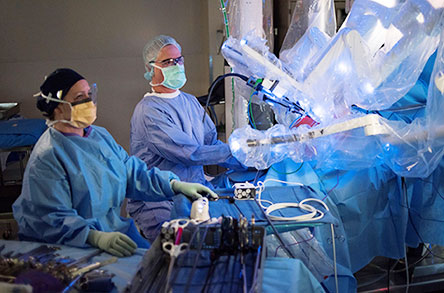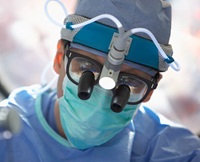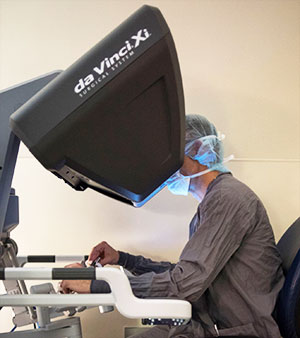
The da Vinci Surgical System utilizes advanced, robotic, computer, and optical technologies to assist your surgeon with your operation. Its movements are controlled by your surgeon. The system has a 3-D high definition (3D-HD) vision system, special instruments, and computer software that allow your surgeon to operate with enhanced vision, precision, and dexterity. The 3D-HD image is highly magnified and extremely detailed, so your surgeon has a clear, close-up view of the area he or she is operating on. The da Vinci instruments have mechanical wrists that bend and rotate to mimic the movements of the human wrist, but have an even greater range of motion—allowing your surgeon to make small, precise movements inside your body in areas that are otherwise difficult to reach.
Please discuss with your doctor whether surgery using the da Vinci Surgical System is right for you.
Robotic Surgery: Areas of Expertise

Acute Care and General Surgery
Acute and General Surgeons with Robotic Surgical Expertise

Thoracic Surgery
Thoracic Surgeons with Robotic Surgical Expertise

Specialty Gastrointestinal, Pancreatic and Colorectal Surgery
Specialty Surgeons with Robotic Surgical Expertise
- Joshua Barton, MD - pancreatic surgery
- Jason Kemp, MD - bariatric surgery
- Benjamin Karsten, MD - colorectal surgery
- Jennifer Lee, MD - colorectal surgery

Gynecologic Robotic Surgery
General Gynecology Surgeons with Robotic Surgical Expertise
Specialty Gynecology Surgeons with Robotic Surgical Expertise
- Amy Cooper, MD - gynecologic oncology
- Gerardo Perez, MD - gynecologic oncology
- Taylor Turner, MD - gynecologic oncology

Female Pelvic Medicine and Reconstructive Surgery (Urogynecology)
Female Pelvic Medicine Surgeons with Robotic Surgical Expertise

Adult Urology
One of our robotic surgeons has additional specialty and fellowship training in urologic oncology, a urology sub-specialty.
General Urology Surgeons with Robotic Surgical Expertise
Specialty Urologic Surgeons with Robotic Surgical Expertise
- Stephen Brassell, MD - urologic oncology

Pediatric Urology
Frequently Asked Questions
Click each question below for its answer:
 During a robotic surgery procedure, tiny instruments and a miniature high-definition camera are inserted into the patient's body near the affected area, sometimes using very small incisions, if necessary. The surgeon will then control the camera and instruments from a nearby console to complete the operation.
During a robotic surgery procedure, tiny instruments and a miniature high-definition camera are inserted into the patient's body near the affected area, sometimes using very small incisions, if necessary. The surgeon will then control the camera and instruments from a nearby console to complete the operation.The da Vinci robot is a system that allows your surgeon to control the surgical instruments. The robot does not make decisions or incisions on its own. Your surgeon tells the robot exactly what to do, and the robot enables improved vision, precision, and dexterity for the surgeon. The surgeon is in the operating room controlling the robot and the procedure during your entire surgery.
